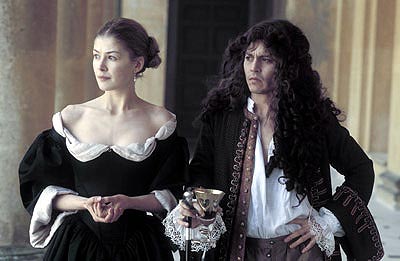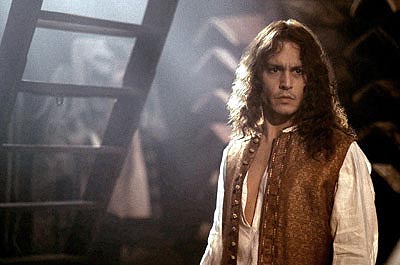The Libertine
I am John Wilmot, Second Earl of Rochester and you will not like me. Or my brother, Gary.

Second Earl of Rochester John Wilmot (Johnny Depp) carouses in a 17th century London still reeling from plagues and fires. After the dissolution of Cromwell's short lived headless state formed after putting the previous King into a headless state (NB: Historical accuracy sacrificed in favour of cheap gag), Charles II (John Malkovich) and his preposterous prosthetic nose is parachuted onto the throne ushering in an era of Renaissance for the arts, drinking and sex. Wilmot is very much a man of these times, an occasional poet and playwright but a full-time boozer and whorer. The Libertine is an account of his life and death that seeks to play him as a tortured genius, ever hampered by his self destructive nature as he rails against established society and the monarchy itself.
That he comes across as being the 17th century version of Viz is perhaps a tad unfortunate, but what the hey. Here we are treated to Wilmot's infatuation with a young actress Elizabeth Barry (Samantha Morton), the stress this puts on the rapidly cooling relationship with his wife Elizabeth Malet (Rosamund Pike) and his one sided antagonism against King Charles 2 - Electric Boogaloo. It's all very interesting, from his introduction to us telling us what a bastard he is to his pox-enabled shuffling off this mortal coil (syphilis, I assume). Interesting, you will note, does not necessarily equate to 'successful', or indeed 'good'.
That said, The Libertine for the most part is fairly successful, and it is fairly good. After all, it's difficult to really be too critical of a film featuring a dwarf being dragged around on a giant phallus-shaped chariot. Wilmot's an intriguing character and Depp displays his usual excellence in portraying him. The people in his immediate circle prove to be no less interesting and no less consummately played. Even by Johnny Vegas.

Often it seems that the title of Libertine isn't supposed to refer to the political / philosophical system of free thinking regardless of societies established mores and more to do with Pete Doherty of the similarly titled bands' appetite for killing himself through substance abuse. Wilmot may not want you to like him, as he tells us at the outset and indeed he does very little to encourage the liking of him. The odd flash of wit on display tends to be buried under boorish drunken ribaldry, self aggrandizement and deep running character flaws.
Despite all this, you still end up at least partially warming to him. For once Depp's tremendous likability works against the goals of the film. It's not quite right to say we end up rooting for him against the King because frankly it's never clear exactly what he's railing against. He's almost like the prototype for James Dean's Rebel WIthout A Cause, with the same brand of anti-hero charm.
The point, I suppose, is that as Charlie boy wished Wilmot could have been his generation's Shakespeare, were he not so preoccupied with drinking himself into the ground and writing little more than dirty limericks. This isn't so much a waste of talent as it is criminal destruction. Whether this tenet holds up to examination or not, The Libertine is a competent drama, solidly if unspectacularly directed by first-timer Laurence Dunmore, although to be fair it's not the sort of subject matter that lends itself to spectacle. It boasts a costume department that can be proud of themselves, a makeup department that can be proud of itself for Depp's final reel flakings and deeply ashamed of themselves for Malkovich's obviously bejoined nose and a soundtrack that occasionally overwhelms the rest of the film, although not in a good way.
All of this combines to a solid slice of entertainment. It's interesting; a welcome relief given the summer we've had, but never close to essential. We should, I suppose, point out that this film is full of sex, although not explicit, and foul language, which is very explicit. I wager this sports the highest count of the dreaded C-Word since Gangster No. 1, so if this is the sort of thing that offends you consider yourself warned. I further suppose that this is a superfluous warning as if this is the sort of thing that offends you, you wouldn't contemplate watching a film that primarily concerns itself with this sort of thing. Certainly it's more worthy of attention than the last period drama that darkened our doorstep.
Were I in the business of passing quantifiable judgements, I'd award this 3/5 TippyMarks.
Samantha Morton (Elizabeth Barry)
John Malkovich (King Charles II)
Paul Ritter (Chiffinch)
Stanley Townsend (Keown)
Francesca Annis (Countess)
Rosamund Pike (Elizabeth Malet)
Johnny Vegas (Sackville)
Richard Coyle (Alcock)